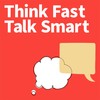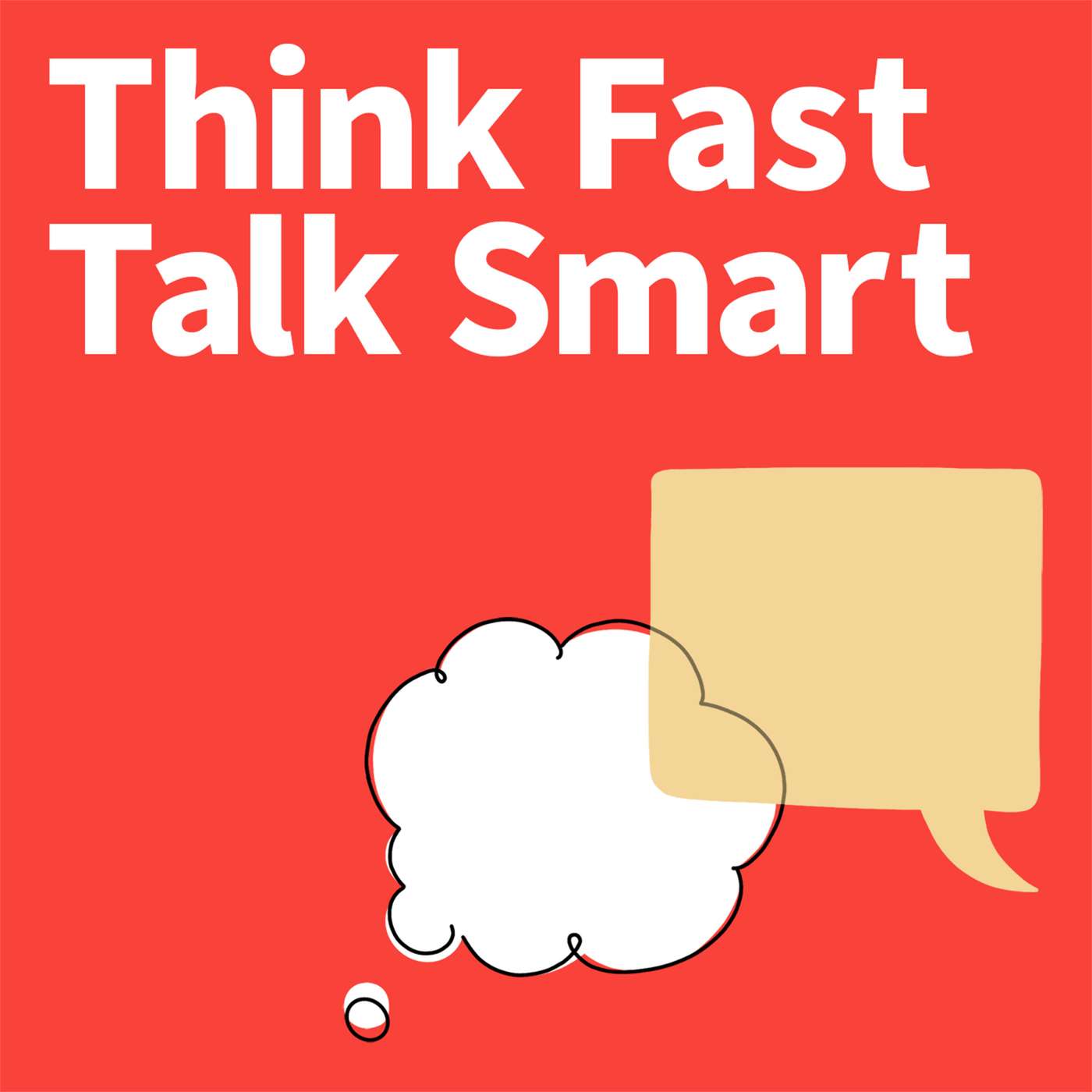

Think Fast Talk Smart: Communication Techniques
Matt Abrahams, Think Fast Talk Smart
One of the most essential ingredients to success in business and life is effective communication.
Join Matt Abrahams, best-selling author and Strategic Communication lecturer at Stanford Graduate School of Business, as he interviews experts to provide actionable insights that help you communicate with clarity, confidence, and impact. From handling impromptu questions to crafting compelling messages, Matt explores practical strategies for real-world communication challenges.
Whether you’re navigating a high-stakes presentation, perfecting your email tone, or speaking off the cuff, Think Fast, Talk Smart equips you with the tools, techniques, and best practices to express yourself effectively in any situation. Enhance your communication skills to elevate your career and build stronger professional relationships.
Tune in every Tuesday for new episodes. Subscribe now to unlock your potential as a thoughtful, impactful communicator. Learn more and sign up for our eNewsletter at fastersmarter.io.
Join Matt Abrahams, best-selling author and Strategic Communication lecturer at Stanford Graduate School of Business, as he interviews experts to provide actionable insights that help you communicate with clarity, confidence, and impact. From handling impromptu questions to crafting compelling messages, Matt explores practical strategies for real-world communication challenges.
Whether you’re navigating a high-stakes presentation, perfecting your email tone, or speaking off the cuff, Think Fast, Talk Smart equips you with the tools, techniques, and best practices to express yourself effectively in any situation. Enhance your communication skills to elevate your career and build stronger professional relationships.
Tune in every Tuesday for new episodes. Subscribe now to unlock your potential as a thoughtful, impactful communicator. Learn more and sign up for our eNewsletter at fastersmarter.io.
Episodes
Mentioned books

258 snips
Jan 23, 2025 • 23min
180. Unlocking Your Future Self: Communication, Happiness & Wellbeing
Hal Hershfield, a UCLA professor and author of 'Your Future Self,' dives into how envisioning our future selves can transform our present choices. He explains that by treating our future selves like distinct individuals, we can enhance decision-making and combat procrastination. Hershfield emphasizes practical strategies like writing letters to our future selves and employing temptation bundling for better motivation. The discussion also highlights the significance of clear communication in achieving personal growth and success.

283 snips
Jan 21, 2025 • 25min
179. Finding Positive in Negative Emotions: Communication, Happiness & Wellbeing
Laurie Santos, a Yale psychology professor and host of The Happiness Lab, chats with Matt Abrahams about the dual nature of happiness. They discuss the importance of both joy in daily life and a sense of purpose. Santos emphasizes that negative emotions are essential for growth, urging listeners to embrace them rather than shy away. The conversation also highlights the power of gratitude in nurturing relationships and effective communication, while touching on the impact of technology on emotional connections.

272 snips
Jan 14, 2025 • 24min
178. Navigating Chaos and Uncertainty: The Power of Transparency and Empathy
Dr. Anthony Fauci, a leading expert in infectious diseases and a trusted voice during the COVID-19 pandemic, discusses the importance of clear communication. He emphasizes knowing your audience and delivering concise messages. Fauci advocates for transparency regarding what is known and unknown, highlighting that honesty builds trust. The conversation also delves into managing uncertainty and conflict, and the necessity for preparation in unexpected scenarios. His insights underscore that effective communication fosters compassion and connection.

447 snips
Jan 7, 2025 • 25min
177. Don’t Resolve, Evolve: Top 10 Lessons For 2025
Explore ten game-changing communication strategies that can transform your personal and professional interactions. Discover how to blend authority with warmth for effective leadership. Learn the art of persuasion and the importance of creating supportive environments. Master concise communication to articulate your thoughts clearly. Navigate tough conversations using the HEAR framework, and uncover the dangers of jargon that hinder understanding. Each lesson is designed to inspire and equip you for a more impactful 2025.

113 snips
Dec 31, 2024 • 23min
176. From Stereotypes to Synergy: Communicating Across Generations
Bob McCann, Director of UCLA's Leadership Communication Program and expert in intergenerational dynamics, shares his insights on age diversity in the workplace. He emphasizes that fostering connections between generations can greatly enhance organizational success. McCann explores innovative strategies like reverse mentoring and shadow boards, highlighting how they drive collaboration and innovation. Additionally, he discusses the overlooked importance of age diversity in DEI initiatives, advocating for a shift towards meaningful intergenerational engagement for better outcomes.

139 snips
Dec 26, 2024 • 20min
Ask Matt Anything (AMA) 1: Trust, Paraphrasing, and Nonverbal Cues
Dive into engaging strategies for balancing emotions with communication. Discover how paraphrasing can validate feelings while fostering dialogue. Learn effective techniques for navigating discussions with assertive leaders and enhancing online engagement. Explore the importance of self-observation in improving nonverbal cues and body language. Gain insights into managing communication across hierarchical dynamics, highlighting the value of active listening and body language adjustments. This session is packed with actionable tips for becoming a more effective communicator!

239 snips
Dec 24, 2024 • 20min
175. Mastering Toasts and Tributes: Making Your Words Count
Discover effective strategies for crafting memorable toasts and tributes. Learn a four-part formula that keeps the focus on honorees, making speeches feel like gifts. Get tips on how to be brief and impactful, and prepare for emotional moments with confidence. With stories from real-life experiences, you'll find ways to enhance your public speaking skills for weddings and professional events alike. Transform your words into heartfelt expressions that leave a lasting impression on your audience!

405 snips
Dec 17, 2024 • 24min
174. Fix Meetings: Transform Gatherings Into Meaningful Moments
Priya Parker, author of The Art of Gathering and expert facilitator, shares her insights on transforming meetings and gatherings into meaningful experiences. She emphasizes that 90% of a gathering's success is determined before it begins, highlighting the need for intentionality in planning. Parker discusses strategies for fostering deeper connections, crafting engaging invitations, and leaving lasting impacts with effective closures. She also addresses navigating emotionally charged conversations and adapting to new dynamics in the post-pandemic world.

80 snips
Dec 10, 2024 • 18min
173. Rethinks: Surviving the Holidays
The holiday season can be tricky for communication. Learn how to insert your voice into conversations without dominating them. Discover expert strategies for mastering small talk and turning it into a meaningful connection. Plus, get tips on navigating conflicts with clarity and empathy. These insights aim to reduce stress and enhance relationships, transforming challenges into opportunities for connection.

255 snips
Dec 5, 2024 • 22min
Between the Lines: In Storytelling, Simplify to Amplify - Premium Sampler
Hilary Price, cartoonist and creator of the daily comic strip Rhymes with Orange, shares her insights on storytelling through humor and minimalism. She emphasizes starting at the action moment to engage the audience effectively. Price discusses the importance of surprise and leaving space for readers' interpretations, ensuring clarity in communication. With her unique approach to narrative crafting, she illustrates how simplicity can amplify impact, reminding us that the magic often lies in the unsaid elements of a story.


